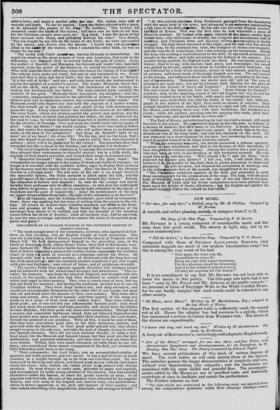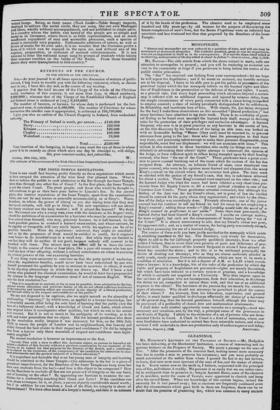NEW MUSICk "For thee, for only thee," a Ballad, sung by 211r. IL Phillips. Composed by W. Borhtn.
A smooth and rather pleasing melody, in compass from C to E.
The Song of the Dew Fizys. Composed by T. H. Severn.
Mr. SEVERN is a young composer of considerable merit, and this song does him great credit. The chorus is light, airy, and by no means commonplace.
"Flit the Goblet," a Bacchanalian Song. Composed by T. H. Severn. Compared with those of GEORGE ALEXANDER STEVENS, what miserable doggrels are most of our modern bacchanalian songs! but this is among the very worst of the ,bad.
"Now again the wine-cup fill, An antidote to every ill : Bring me care with aspect frowning, I'm in a glorious mood for drowning : And o'er his wither'd wrinkled corse, I'll sing his requiem till I'm hoarse."
It is no compliment to say that Mr. SEVERN has not been able to lower his music to this poetry. The title-page sets forth that it has been " sung by Mr. FIELD and Mr. ATKINS, at the public concerts :" we presume at those of Bagnigge Wells or the White Conduit House, for we can hardly imagine that such words could be tolerated in any other society.
" Oh Music, sweet Music." Written by W. Bartholomew, Esq.; adapted to the last Waltz of Weber.
The first section of this elegant waltz is sufficiently vocal, the second not at all. Hence the adapter has had recourse to a melody, which has occasioned a serious deviation from WEBER'S text. The errors in the chorus are unpardonable.
"I dance and sing, and touch my lute." Written by IV. Bartholomew. Tlw music by Beethoven.
A lively air of BEETHOVEN'S, exceedingly well adaptedto English words • "Airs of the Rhine," arranged for one, two, three, and four Voices, with characteristic Symphonies and Accompaniments, for the Pianoforte, by IV. Horsley, Mae. Bac. Oxon. The Poetry translated by Edward Taylor. We have several publications of this kind, of various degrees of merit. The work before us will rank among those of the highest. The melodies possess the happy characteristics of simplicity and ease, without ever degenerating into vulgarity; and the harmonies are combined with the same skilful and graceful flow. The accompaniments added by Mr. HORSLEY are in excellent taste, and materially contribute at once to facilitate and enrich the performance.
The Preface informs us, that "The Airs which are contained in the following work are selected from among the compositions generally called Mehr stimmige Gesiinge—manY voiced Songs. Being, as their name (Tisch Lied:er—Table Songs) imports, destined to enliven the social circle, they are sung, like our own Madrigals and Glees, wholly without accompaniment, and are published in single parts. In a country where the habits and tastet•of the people are so simple and social as in Germany, where there is so little representation, and so much unaffected enjoyment of easy and accessible pleasures, such a species of music is naturally very popular. Enthusiastic admirers of nature, as well as lovers of music for its own sake, it is no wonder that the Germans prefer a form of it which can be enjoyed in the open air, and without any of the expense, preparation, or restraint of musical entertainments. It is not unusual to hear the national songs sung by groups of students while taking their summer rambles on the banks of the Rhine. From those beautiful shores they were transplanted to this country."



















 Previous page
Previous page